If you’re passionate about no-code development, a digital creator, or part of a growing team ready to level up, you’ve probably asked yourself: What happens when drag-and-drop simplicity just isn’t enough? How do you build a CRM with real depth, a multi-role operations hub, or a customer-facing app that’s built to scale? That’s where exploring Softr alternatives becomes essential.
This isn’t about Softr falling short—it’s about your project outgrowing its initial toolkit. Think of it like trading a dependable daily driver for a high-performance machine built for the long haul.
Keep reading, we have listed 6 best Softr alternatives that are worth trying.
Why Consider Softr Alternatives?
Many users begin looking for Softr alternatives when they run into these specific challenges:
- Complex Data Relationships: If you’re building something like a detailed CRM or multi-layered project management tool, Softr’s flat data model can feel restrictive. You might need a platform that supports true relational databases.
- Advanced Automation Needs: While Softr handles basic workflows well, scaling to multi-step or conditional processes often requires more powerful logic and automation capabilities.
- Granular User Permissions: If you’re designing internal tools with varied user roles, you’ll need more detailed control over what each user can see or do.
- Backend Flexibility: Relying solely on Airtable can become a constraint. Many growing businesses benefit from platforms that allow connections to SQL databases, REST APIs, or other external data sources.
- Customization: Softr offers great templates, but teams building highly specialized tools often need deeper UI/UX control, including the ability to add custom code or unique components.
If these points sound familiar, it might be time to explore tools beyond Softr.
6 Best Softr Alternatives That Are Worth Trying
The ideal Softr alternative depends on your project’s specific needs. Are you building a mobile app? A data-heavy internal dashboard? A full-scale web application? Each platform below brings something unique to the table.
1. Adalo
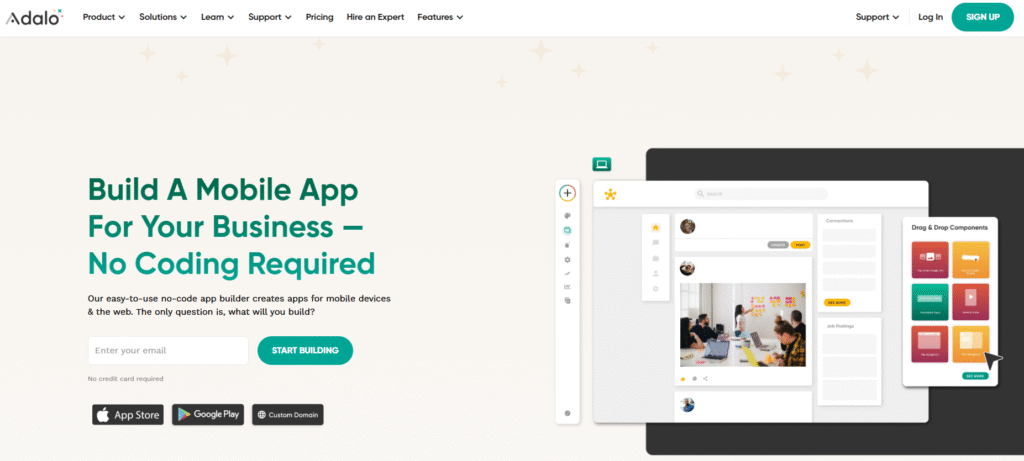
If your goal is to create a native mobile app for iOS or Android without coding, Adalo is a compelling alternative to Softr. It focuses specifically on the mobile experience, making it easier to design, test, and publish apps directly to app stores.
Adalo’s interface is tailored for mobile design, helping you create intuitive user experiences with drag-and-drop simplicity. It’s ideal for consumer apps, membership platforms, or utility applications.
Key Features:
- Publish native mobile apps to iOS and Android
- Customizable mobile UI components
- Direct App Store publishing
- Integration options with tools like Zapier and Airtable
Pricing: Free plan for everyone. Paid plan starts from $45 per month (Billed Monthly).
2. Bubble
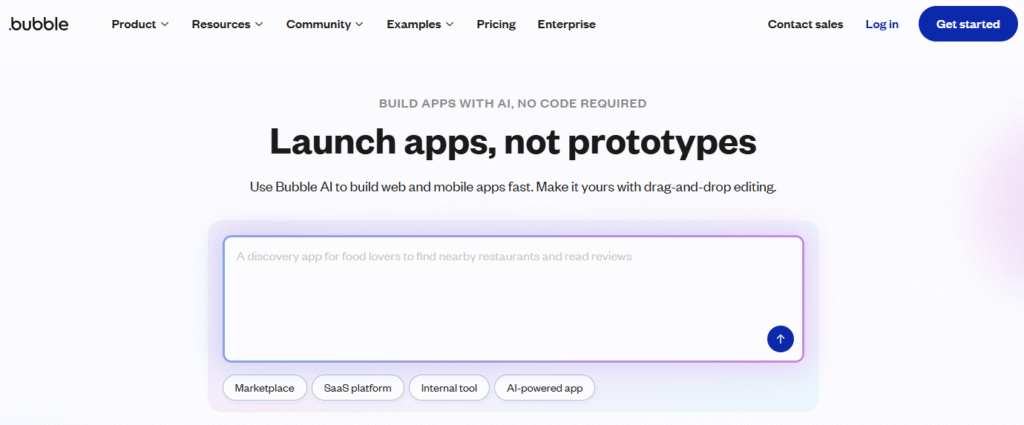
For those looking to build sophisticated, scalable web applications, Bubble stands out among Softr alternatives. It offers visual programming for designing full-stack apps—complete with databases, user authentication, and responsive designs—without writing code.
Bubble is ideal for startups and businesses building marketplaces, SaaS products, or community platforms. Its extensive plugin ecosystem and API capabilities make it highly adaptable.
Key Features:
- Robust visual workflow editor
- Fully customizable databases
- Extensive plugin library
- Strong community and learning resources
Pricing: Starter Plan priced at $69/month.
Related Reading: Softr vs Bubble
3. Glide

Glide is perfect if you live in spreadsheets but want to turn data into interactive web or mobile apps. It syncs in real time with tools like Google Sheets and Airtable, making it one of the simplest Softr alternatives for data-centric applications.
Use Glide for internal tools, event apps, inventory management, or customer portals. Its simplicity and speed are major advantages.
Key Features:
- Real-time data sync
- Mobile-friendly templates
- User access controls
Pricing: Free plan available. Business plan starts at $199 per month.
4. WeWeb
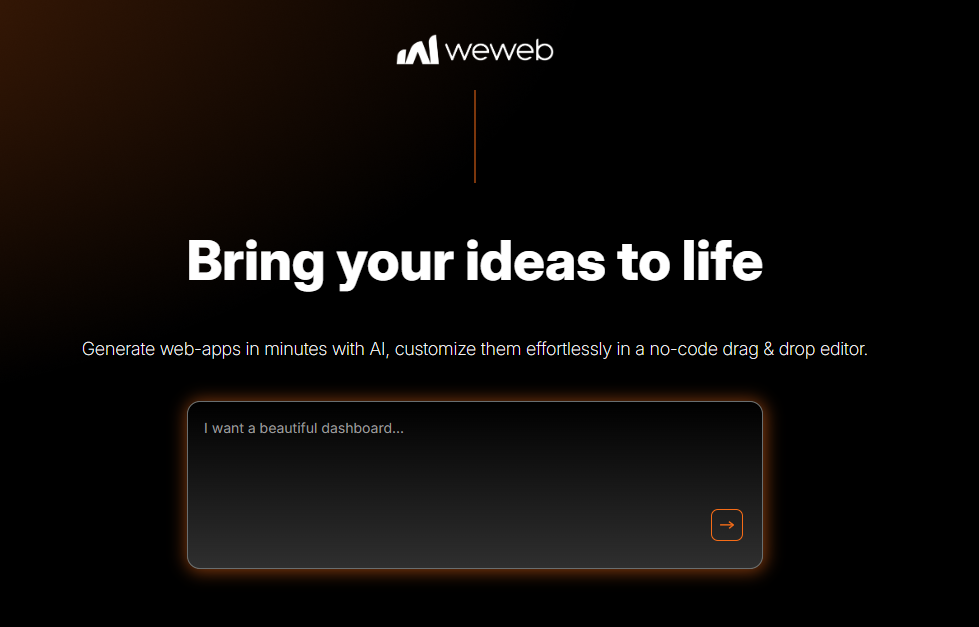
WeWeb is a visual front-end builder that works with almost any backend—from Xano to Firebase—making it extremely flexible. If you need more control over the UI and data architecture than Softr allows, WeWeb is a strong contender.
It’s great for developers and tech teams building highly customized web applications with complex state management or dynamic content.
Key Features:
- Works with external databases and APIs
- Custom code support (JavaScript/Vue.js)
- Real-time preview
- Exportable code
Pricing: Essential plan priced at $16/month with 10 million AI tokens.
5. Bildr
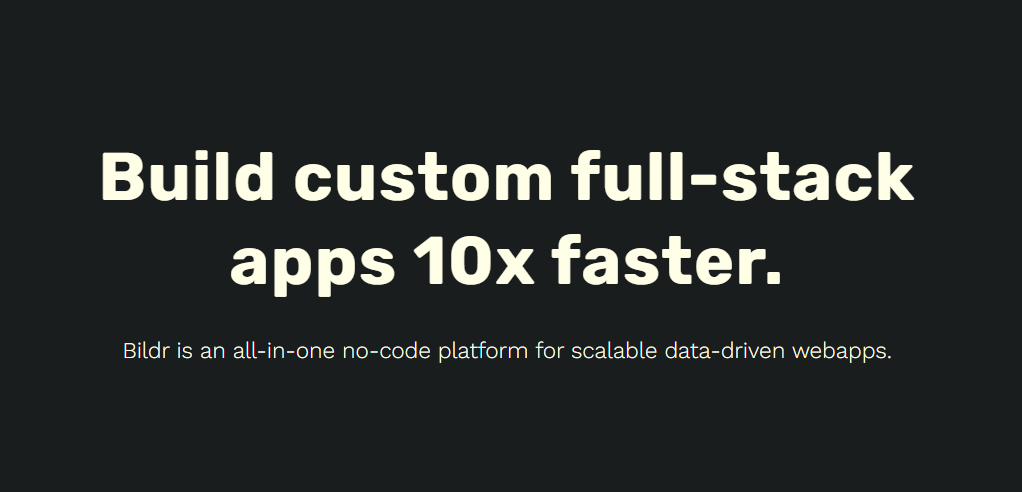
Bildr offers a modular, component-based approach to app building. It’s designed for creating complex web apps with reusable elements, making it a scalable Softr alternative for growing projects.
It suits developers and agencies building client projects or internal tools that require custom functionality and white-label solutions.
Key Features:
- Custom components and actions
- Support for JavaScript integrations
- Responsive design controls
- Team collaboration features
Pricing: Build for free. Share live previews as you go & upgrade to publish for just $29/month.
6. OutSystems
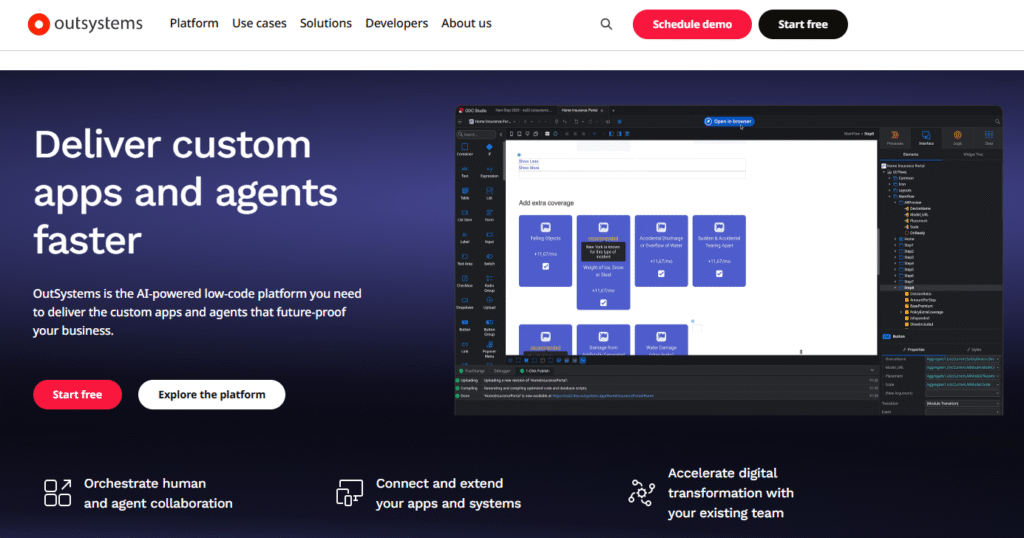
If you’re in an enterprise environment and need a low-code platform with powerful capabilities, OutSystems is a standout choice. It helps teams build scalable, secure applications faster, with options for cloud or on-premise deployment.
While it’s more technical than Softr, it offers advanced integration, debugging, and lifecycle management features.
Key Features:
- Full application lifecycle support
- Advanced integration options
- Strong security and compliance
- High-performance deployment
Pricing: OutSystems Developer Cloud (ODC) starts at $36,300 per year.
Final Thoughts on Softr Alternatives
Choosing the right Softr alternative depends on your project’s stage and needs. Softr is an excellent starting point for simple apps and prototypes, but as you scale, you may need more powerful features, customization, or backend flexibility.
Whether you choose Adalo for mobile, Bubble for web apps, Glide for data-driven tools, or another platform, the no-code/low-code world is rich with options. Your next step isn’t about finding the “best” tool—it’s about finding the best AI App builder for you.



